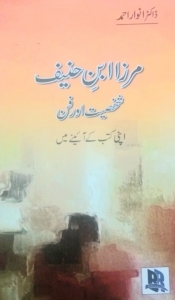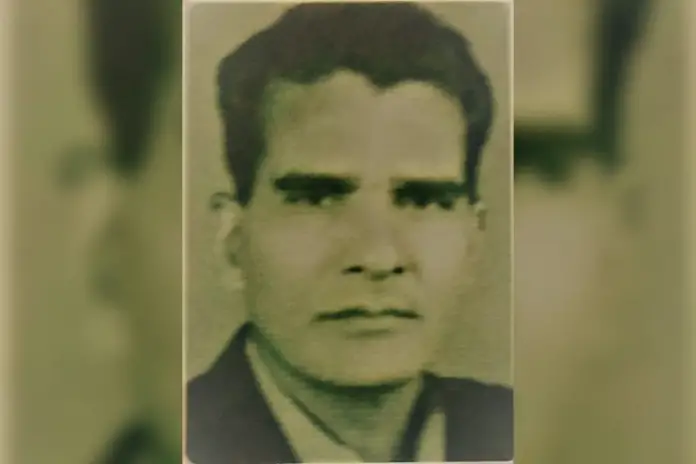He led an ordinary life as most of the people belonging to the lower strata of life do. He had his share of problems as well as ups and downs to grapple with. He didn’t enjoy the luxury of earning a steady income to cater to the needs of the family and hence was in a financial crisis most of the times. But against all these gigantic odds, he stuck to his primary passion and didn’t waver till his last breath. His passion was everything related to archeology and history, especially the primitive ages of mankind, and the historical remains that his area was endowed with. So without a doubt, his was a journey that was truly inspirational as nothing distracted him from exploring the historical sites and chronicling them for the later generations. He was none other than Mirza Zareef Baig who was better known as Mirza Ibn-e-Hanif.
Mirza Zareef Baig was a known figure in the country for his books and his is a classic example of an individual’s sheer brilliance and the apathy of the state towards scholarly pursuits. Instead of bemoaning the lackluster rather derogatory attitude of the government towards scholarship, he carved out his own path and did brilliant work in the fields of history, archeology, and anthropology.
Dr. Anwar Ahmad, famous academic and author, was among those few people who knew Ibn-e-Hanif for decades. Anwar Ahmad was a student when he chanced to meet him and then and there they both seemed to have hit it off instantly as the love for the books was a common thread. Dr. Anwar Ahmad has drawn an acerbic sketch of Ibn-e-Hanif which throws light on the genius of Mirza with a fair dose of wit. The recent short volume “Mirza Ibn-e-Hanif – Shakhsiat Aur Fun” (published by Books and Readers, Multan, 2020) is a short yet handy introduction to the life and times of the extra-ordinary scholar, Mirza Ibn-e-Hanif.

Born in Hisar, Haryana (India) in 1930, his family moved to Pakistan and shifted to Multan. He couldn’t pass his bachelors examination and flunked in the subject of history! That was quite a setback for the young guy who inherited the passion of visiting old remains and historical sites from one of his paternal uncles. Undeterred by academic failure, he became engrossed in books and also started visiting historical sites like Harappa, Mohenjo-Daro and others of the kind. He found solace amongst these cradles of civilization and thus he dived deep into the primitive ages and came up with many monumental books on the topics of ancient history and the ages of primitive men. He did a few odd jobs to run his kitchen and some of his friends, Anwar Ahmad being one of them, helped him get a job to make his life less cumbersome. Dr. Anwar Ahmad claims that he benefitted from the expertise of Mirza Ibn-e-Hanif when he set up a museum at Bahauddin Zakariya University, Multan. Ibn-e-Hanif fully supported the museum and he went so far as to gift his treasure of the historical artifacts and figurines of the ancient era without charging even a single penny!
When you look at the titles written by Mirza Ibn-e-Hanif, you get dazzled by his sheer brilliance and perseverance. Here was an ancient soul who reappeared and tried to acquaint us with the tales of the bygone eras. Some of his books are ‘Saat Daryaon Ki Sarzameen’, ‘Misar Ka Qadeem Tareen Adab’, ‘Dunya Ka Qadeem Tareen Adab’, ‘Bhooli Bisri Kahanian’, ‘Janoobi Punjab Kay Asaar-e-Qadeema’, ‘Hazaroon Saal Pehlay’ and ‘Gilgamesh Ki Dastaan’. Ibn-e-Hanif did a wonderful job and he was lucky that his voluminous books got published in his native city Multan and people like Anwar Ahmad stood by them.
It was in 2005 that he was diagnosed with a terminal disease in Multan and thus a glorious episode came to an end. But we are all mortals and are eventually going to die. But have we been able to live our lives fully? Or did we try to enrich the world we inhabit? Or did we always bemoan the problems that come our way? Mirza Ibn-e-Hanif didn’t waste time brooding. Instead, he worked throughout his life and produced authentic tomes on our land and tried to explore its antiquity. Anwar Ahmad has done well to revive the memories of Mirza Ibn-e-Hanif for the younger generations. This slim book serves as a primary introductory tome for the uninitiated. One hopes that a few young ones pick up this book and update themselves about what they have missed so far.







